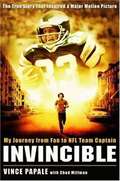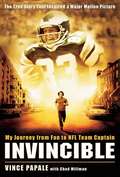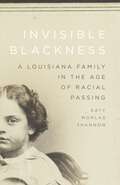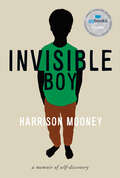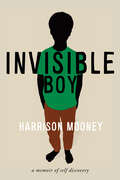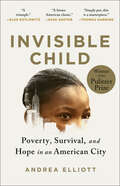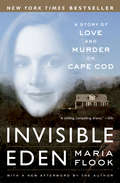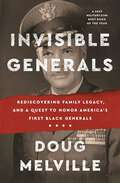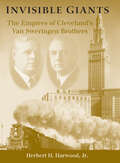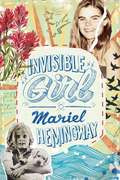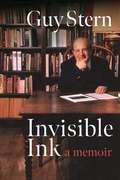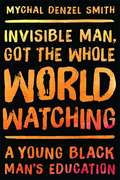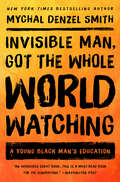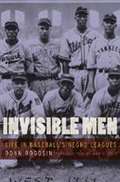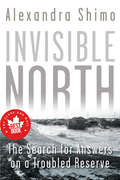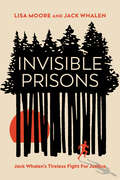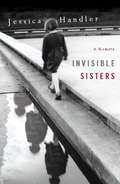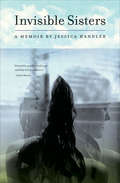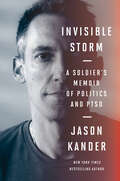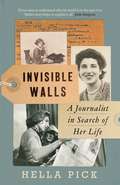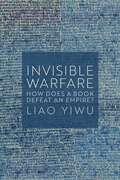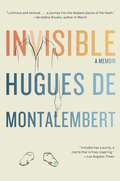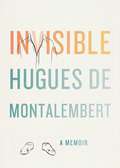- Table View
- List View
Invincible: My Journey from Fan to NFL Team Captain
by Vince Papale Chad MillmanIN 1976, VINCE PAPALE WAS A DOWN-ON-HIS-LUCK SUBSTITUTE TEACHER, part-time bartender, and season ticket holder for the Philadelphia Eagles, the team he'd grown up rooting for. He had always loved football, but the closest he'd ever come to playing on Sundays was in local rough touch leagues. Until fate stepped in. Vince was thirty years old and wondering what he would do with his life, when he heard that Coach Dick Vermeil was holding open tryouts for the Eagles. He had nothing to lose, and with the coaches eyeing him, he ran an explosive 40-yard dash in just 4.5 seconds-a world-class time-and was offered a contract on the spot. But, as much as his speed, it was Vince's heart that impressed Vermeil. But there was more to the story-Vince's success was tempered by a complicated family life, a past that continued to haunt him, even as a hometown football hero. At its core, Invincible is an underdog story that will inspire others to pursue their dreams, too. VINCE PAPALE is a former Philadelphia Eagles player whose life is the subject of an upcoming movie. He lives in Cherry Hill, New Jersey. CHAD MILLMAN is the NFL editor, for ESPN the Magazine and the author of The Detonators and The Odds. He lives in Montclair, New Jersey, with his wife and son.
Invincible: My Journey from Fan to NFL Team Captain
by Vince PapaleThe true story of the NFL's oldest rookieIn 1976, Vince Papale was thirty, a former schoolteacher and part-time bartender, and a season ticket-holder for his beloved Philadelphia Eagles. When he heard that Coach Dick Vermeil was holding open tryouts, he decided to give it a shot. Shocking himself and the coaches, he ran an explosive 40-yard-dash in just 4.5 seconds--a world-class time--and was offered a contract on the spot. When he joined the team, Papale became the oldest non-kicking rookie in NFL history, a fan favorite who played for four years and was named a team captain. Invincible is Vince Papale's story, and a tie-in to the Disney Pictures film of the same name starring Mark Wahlberg as Papale and Greg Kinnear as Vermeil. But more than just a tie-in, it tells Papale's story in his own words, covering subjects not included in the film. Like Rudy, Glory Road, and Rookie, it is the true story of an ordinary man who achieves an extraordinary goal.
Invisible Blackness: A Louisiana Family in the Age of Racial Passing
by Katy Morlas ShannonInvisible Blackness explores the complex lives of Creoles of mixed race born in Louisiana to enslaved women and the white men who enslaved them. Individuals such as Alice Thomasson Grice forged their own identities—and often reinvented themselves—within the increasingly strict racial order of antebellum and postbellum Louisiana.Alice Thomasson Grice occupied an unusual position among mixed-race Creoles of her era, as her white father recognized her formerly enslaved mother as his wife and raised Alice and her siblings as free people. After Alice married a white steamboat captain, Charles Grice, she and her children chose to identify as white. Invisible Blackness explores why Alice, her children, and friends in similar positions elected to cross the color line during the so-called “great age of passing” that spanned from 1880 to 1925.While it’s impossible to quantify the number of people who crossed the color line at any given time, evidence suggests that the rate of passing corresponded closely with the severity of anti-Black oppression and discrimination. By the 1890s, when the Supreme Court upheld Jim Crow laws and lynchings were on the rise, Black people who could pass had a strong motivation to do so. For the Grices, passing afforded the only means of social, economic, and political advancement available to them.Drawing on a vast array of primary sources, ranging from sacramental records and bills of sale to wills and military pension files, Invisible Blackness sheds light on how this liminal group of individuals defined themselves and shaped their identities. The lives of the Grices and people like them underscore that race is both a social construct and a significant lived reality. Beyond these broad, pressing historical questions lie issues of love, family, and the universal quest for belonging that transcend time, place, and race.
Invisible Boy: A Memoir of Self-Discovery (Truth To Power Ser.)
by Harrison MooneyA narrative that amplifies a voice rarely heard—that of the child at the centre of a transracial adoption—and a searing account of being raised by religious fundamentalistsHarrison Mooney was born to a West African mother and adopted as an infant by a white evangelical family. Growing up as a Black child, Harry’s racial identity is mocked and derided, while at the same time he is made to participate in the fervour of his family’s revivalist church. Confused and crushed by fundamentalist dogma and consistently abused for his colour, Harry must transition from child to young adult while navigating and surviving zealotry, paranoia and prejudice.After years of internalized anti-Blackness, Harry begins to redefine his terms and reconsider his history. His journey from white cult to Black consciousness culminates in a moving reunion with his biological mother, who waited twenty-five years for the chance to tell her son the truth: she wanted to keep him.This powerful memoir considers the controversial practice of transracial adoption from the perspective of families that are torn apart and children who are stripped of their culture, all in order to fill evangelical communities’ demand for babies. Throughout this most timely tale of race, religion and displacement, Harrison Mooney’s wry, evocative prose renders his deeply personal tale of identity accessible and light, giving us a Black coming-of-age narrative set in a world with little love for Black children.
Invisible Boy: A Memoir of Self-Discovery (Truth to Power)
by Harrison MooneyAn unforgettable coming-of-age memoir about a Black boy adopted into a white, Christian fundamentalist familyPerfect for fans of Educated, Punch Me Up to the Gods, and Surviving the White Gaze&“An affecting portrait of life inside the twin prisons of racism and unbending orthodoxy.&” --Kirkus ReviewsA powerful, experiential journey from white cult to Black consciousness: Harrison Mooney&’s riveting story of self-discovery lifts the curtain on the trauma of transracial adoption and the internalized antiblackness at the heart of the white evangelical Christian movement.Inspired by Ralph Ellison&’s Invisible Man the same way Ta-Nehisi Coates&’s Between the World and Me was inspired by James Baldwin, Harrison Mooney&’s debut memoir will captivate readers with his powerful gift for storytelling, his keen eye for insight and observation, and his wry sense of humor.As an adopted and homeschooled Black boy with ADHD at white fundamentalist Christian churches and tent revivals, Mooney was raised amid a swirl of conflicting and confusing messages and beliefs. Within that radical and racist right-wing bubble along the U.S. border in Canada's Bible Belt, Harrison was desperate to belong and to be "visible" to those around him.But before ultimately finding his own path, Harrison must first come to understand that the forces at work in his life were not supernatural, but the same trauma and systemic violence that has terrorized Black families for generations. Reconnecting with his birth mother--and understanding her journey--leads Harrison to a new connection with himself: the eyes looking down were my true mother&’s eyes, and the face was my true mother&’s face, and for the first time in my life, I saw that I was beautiful.
Invisible Child: Poverty, Survival and Hope in an American City
by Andrea ElliottInvisible Child follows eight dramatic years in the life of a girl whose imagination is as soaring as the skyscrapers near her Brooklyn shelter. Dasani was named after the bottled water that signaled Brooklyn’s gentrification and the shared aspirations of a divided city. <p><p>In this sweeping narrative, Elliott weaves the story of Dasani’s childhood with the history of her family, tracing the passage of their ancestors from slavery to the Great Migration north. As Dasani comes of age, the homeless crisis in New York City has exploded amid the deepening chasm between rich and poor. <p><p>Dasani must guide her siblings through a city riddled by hunger, violence, drug addiction, homelessness, and the monitoring of child protection services. Out on the street, Dasani becomes a fierce fighter to protect the ones she loves. When she finally escapes city life to enroll in a boarding school, she faces an impossible question: What if leaving poverty means abandoning your family, and yourself? <p><p>By turns heartbreaking and inspiring, Invisible Child tells an astonishing story about the power of resilience, the importance of family, and the cost of inequality. Based on nearly a decade of reporting, Invisible Child illuminates some of the most critical issues in contemporary America through the life of one remarkable girl.
Invisible Eden: A Story of Love and Murder on Cape Cod
by Maria FlookA literary investigation by "one of the most powerful American writers at work today" [Annie Proulx] of a story that riveted the nation: how an accomplished, world-traveled fashion writer who had retreated to a simpler life as a single mother on Cape Cod became the victim of a brutal, still-unsolved murder.
Invisible Generals: Rediscovering Family Legacy, and a Quest to Honor America's First Black Generals
by Doug MelvilleThis amazing true story of America&’s first Black generals, Benjamin O. Davis Sr. and Jr., a father and son who helped integrate the American military and created the Tuskegee Airmen, is &“the book Black America needs in this moment&” (Eboni K. Williams, lawyer and cohost of State of the Culture).Red Tails, George Lucas&’s celebration of America&’s first Black flying squadron, the Tuskegee Airmen, should have been a moment of victory for Doug Melville. He expected to see his great-uncle Benjamin O. Davis Jr.—the squadron&’s commander—immortalized on-screen for his selfless contributions to America. But as the film rolled, Doug was shocked when he realized that Ben Jr.&’s name had been omitted and replaced by the fictional Colonel A. J. Bullard. And Ben&’s father, Benjamin O. Davis Sr., America&’s first Black general who helped integrate the military, was left out completely. Dejected, Doug looked inward and realized that unless he worked to bring their inspirational story to light, it would remain hidden from the world just as it had been concealed from him. In this &“thoughtful, highly readable blend of family and military history&” (Kirkus Reviews), Melville shares his quest to rediscover his family&’s story across five generations, from post-Civil War America to modern day Asia and Europe. In life, the Davises were denied the recognition and compensation they&’d earned, but through his journey, Melville uncovers something greater: that dedication and self-sacrifice can move proverbial mountains—even in a world determined to make you invisible. Invisible Generals recounts the lives of a father and his son who always maintained their belief in the American dream. As the inheritor of their legacy, Melville retraces their steps, advocates for them to receive their long-overdue honors and unlocks the potential we all hold to retrieve powerful family stories lost to the past.
Invisible Giants: The Empires of Cleveland's Van Sweringen Brothers
by Herbert H. Harwood Jr.A comprehensive biography of the rise of the famous railroad barons who developed Shaker Heights, Ohio.Invisible Giants is the Horatio Alger-esque tale of a pair of reclusive Cleveland brothers, Oris Paxton and Mantis James Van Sweringen, who rose from poverty to become two of the most powerful men in America. They controlled the country’s largest railroad system—a network of track reaching from the Atlantic to Salt Lake City and from Ontario to the Gulf of Mexico. On the eve of the Great Depression they were close to controlling the country’s first coast-to-coast rail system—a goal that still eludes us. They created the model upper-class suburb of Shaker Heights, Ohio, with its unique rapid transit access. They built Cleveland’s landmark Terminal Tower and its innovative “city within a city” complex. Indisputably, they created modern Cleveland.Yet beyond a small, closely knit circle, the bachelor Van Sweringen brothers were enigmas. Their actions were aggressive, creative, and bold, but their manner was modest, mild, and retiring. Dismissed by many as mere shoestring financial manipulators, they created enduring works, which remain strong today. The Van Sweringen story begins in early-twentieth-century Cleveland suburban real estate and reaches its zenith in the heady late 1920s, amid the turmoil of national transportation power politics and unprecedented empire-building. As the Great Depression destroyed many of their fellow financiers, the “Vans” survived through imaginative stubbornness—until tragedy ended their careers almost simultaneously. Invisible Giants is the first comprehensive biography of these two remarkable if mysterious men.
Invisible Girl
by Mariel Hemingway Ben GreenmanWhat is it like to be a teen with depressed addicts for parents, a mentally ill sister, and a grandfather who killed himself? In this moving, compelling diary, Mariel Hemingway writes as her teen self to share her pain, heartache, and coping strategies with young readers."I open my eyes. The room is dark. I hear yelling, smashed plates, and wish it was all a terrible dream." Welcome to Mariel Hemingway's intimate diary of her years as a girl and teen. In this deeply moving, searingly honest young adult memoir, actress and mental health icon Mariel Hemingway shares in candid detail the story of her troubled childhood in a famous family haunted by depression, alcoholism, mental illness, and suicide. Born just a few months after her grandfather, Ernest Hemingway, shot himself, Mariel's mission as a girl was to escape the desperate cycles of debilitating mental health that had plagued generations of her family. In a voice that speaks to young readers everywhere, she recounts her childhood growing up in a family tortured by alcoholism (both parents), depression (her sister Margaux), suicide (her grandfather and four other members of her family), schizophrenia (her sister Muffet), and cancer (mother). It was all the young Mariel could do to keep her head. She reveals her painful struggle to stay sane as the youngest child in her family, and how she coped with the chaos by becoming OCD and obsessive about her food. Young readers who are sharing a similar painful childhood will see their lives and questions reflected on the pages of her diary--and they may even be inspired to start their own diary to channel their pain. Her voice will speak directly to teens across the world and tell them there is light at the end of the tunnel. * A hugely important subject for millions (around 10% of Americans suffer from depression) of young adults who are perhaps growing up in families with mental illness, suicide, depression, schizophrenia, alcoholism, and depression, or who themselves suffer from it. * Very few memoirs speak directly to YA readers about mental illness, depression, and what it is like growing up in a troubled family. * Mariel Hemingway speaks honestly about her own experiences with depression, eating disorders, and OCD, and how she learned to overcome these issues.
Invisible Illnesses and Disabilities: Rebuilding Your Life By Learning To Live with A Non-Terminal Life-Altering Situation
by Sharon SmithLearning to live with invisible illnesses and disabilities
Invisible Ink
by Guy SternInvisible Ink is the story of Guy Stern’s remarkable life. This is not a Holocaust memoir; however, Stern makes it clear that the horrors of the Holocaust and his remarkable escape from Nazi Germany created the central driving force for the rest of his life. Stern gives much credit to his father’s profound cautionary words, "You have to be like invisible ink. You will leave traces of your existence when, in better times, we can emerge again and show ourselves as the individuals we are." Stern carried these words and their psychological impact for much of his life, shaping himself around them, until his emergence as someone who would be visible to thousands over the years. This book is divided into thirteen chapters, each marking a pivotal moment in Stern’s life. His story begins with Stern’s parents—"the two met, or else this chronicle would not have seen the light of day (nor me, for that matter)." Then, in 1933, the Nazis come to power, ushering in a fiery and destructive timeline that Stern recollects by exact dates and calls "the end of [his] childhood and adolescence." Through a series of fortunate occurrences, Stern immigrated to the United States at the tender age of fifteen. While attending St. Louis University, Stern was drafted into the U.S. Army and soon found himself selected, along with other German-speaking immigrants, for a special military intelligence unit that would come to be known as the Ritchie Boys (named so because their training took place at Ft. Ritchie, MD). Their primary job was to interrogate Nazi prisoners, often on the front lines. Although his family did not survive the war (the details of which the reader is spared), Stern did. He has gone on to have a long and illustrious career as a scholar, author, husband and father, mentor, decorated veteran, and friend. Invisible Ink is a story that will have a lasting impact. If one can name a singular characteristic that gives Stern strength time after time, it is his resolute determination to persevere. To that end Stern’s memoir provides hope, strength, and graciousness in times of uncertainty.
Invisible Man, Got The Whole World Watching: A Young Black Man's Education
by Mychal Denzel SmithANew York Times Bestseller New York Times Book Review Editor's Choice How do you learn to be a black man in America? For young black men today, it means coming of age during the presidency of Barack Obama. It means witnessing the deaths of Oscar Grant, Trayvon Martin, Michael Brown, Akai Gurley, and too many more. It means celebrating powerful moments of black self-determination for LeBron James, Dave Chappelle, and Frank Ocean. InInvisible Man, Got the Whole World Watching, Mychal Denzel Smith chronicles his own personal and political education during these tumultuous years, describing his efforts to come into his own in a world that denied his humanity. Smith unapologetically upends reigning assumptions about black masculinity, rewriting the script for black manhood so that depression and anxiety aren't considered taboo, and feminism and LGBTQ rights become part of the fight. The questions Smith asks in this book are urgent--for him, for the martyrs and the tokens, and for the Trayvons that could have been and are still waiting.
Invisible Man, Got the Whole World Watching: A Young Black Man's Education
by Mychal Denzel SmithNew York Times Book Review Editor's ChoiceHow do you learn to be a black man in America? For young black men today, it means coming of age during the presidency of Barack Obama. It means witnessing the deaths of Oscar Grant, Trayvon Martin, Michael Brown, Akai Gurley, and too many more. It means celebrating powerful moments of black self-determination for LeBron James, Dave Chappelle, and Frank Ocean.In Invisible Man, Got the Whole World Watching, Mychal Denzel Smith chronicles his own personal and political education during these tumultuous years, describing his efforts to come into his own in a world that denied his humanity. Smith unapologetically upends reigning assumptions about black masculinity, rewriting the script for black manhood so that depression and anxiety aren't considered taboo, and feminism and LGBTQ rights become part of the fight. The questions Smith asks in this book are urgent--for him, for the martyrs and the tokens, and for the Trayvons that could have been and are still waiting.
Invisible Men: Life In Baseball's Negro Leagues
by Donn Rogosin Monte IrvinIn 1947 Jackie Robinson broke baseball’s color barrier and became a hero for black and white Americans, yet Robinson was a Negro League player before he integrated Major League baseball. Negro League ballplayers had been thrilling black fans since 1920. Among them were the legendary pitchers Smoky Joe Williams, whose fastball seemed to “come off a mountain top,” Satchel Paige, the ageless wonder who pitched for five decades, and such hitters as Josh Gibson and Buck Leonard, “the Ruth and Gehrig of the Negro Leagues.” <p><p> Although their games were ignored by white-owned newspapers and radio stations, black ballplayers became folk heroes in cities such as Chicago, Kansas City, Pittsburgh, Philadelphia, New York, and Washington DC, where the teams drew large crowds and became major contributors to the local community life. This memorable narrative, filled with the memories of many surviving Negro League players, pulls the veil off these “invisible men” who were forced into the segregated leagues. What emerges is a glorious chapter in African American history and an often overlooked aspect of our American past.
Invisible North: The Search for Answers on a Troubled Reserve
by Alexandra ShimoA vivid first-person account of life on a troubled reserve that illuminates a difficult and oft-ignored history. Globe and Mail 100: Best Books of 2016 • The Hill Times: Best Books of 2016 • 2017 RBC Taylor Prize — Longlisted • 2017 BC National Award for Canadian Non-Fiction — Shortlisted • 2016 Speaker's Book Award — Shortlisted When freelance journalist Alexandra Shimo arrives in Kashechewan, a fly-in, northern Ontario reserve, to investigate rumours of a fabricated water crisis and document its deplorable living conditions, she finds herself drawn into the troubles of the reserve. Unable to cope with the desperate conditions, she begins to fall apart. A moving tribute to the power of hope and resilience, Invisible North is an intimate portrait of a place that pushes everyone to their limits. Part memoir, part history of the Canadian reserves, Shimo offers an expansive exploration and unorthodox take on many of the First Nation issues that dominate the news today, including the suicide crises, murdered and missing indigenous women and girls, Treaty rights, Native sovereignty, and deep poverty.
Invisible Prisons: Jack Whalen's Tireless Fight for Justice
by Lisa Moore Jack WhalenRiveting nonfiction from multi-award-winning author Lisa Moore, based on the shocking true story of a teenaged boy who endured abuse and solitary confinement at a reform school in Newfoundland, but survived through grit and redemptive love.Invisible Prisons is an extraordinary, empathetic collaboration between the magnificent writer Lisa Moore, best-known for her award-winning fiction, and a man named Jack Whalen, who as a child was held for four years at a reform school for boys in St John&’s, where he suffered jaw-dropping abuses and deprivations. Despite the odds stacked against him, he found love on the other side, and managed to turn his life around as a husband and father. His daughter, Brittany, vowed at a young age to become a lawyer so that she could seek justice for him. Today, that is exactly what she is doing—and Jack's case is part of a lawsuit currently before the courts.The story has parallels with Unholy Orders by Michael Harris about the Mount Cashel orphanage, and with the many horrific stories about residential schools—all of which expose a paternalistic state causing harm and a larger society looking away. Yet two powerful qualities set this story apart. As much as it is about an abusive system preying on children, it is also a tender tale of love between Jack and his wife Glennis, who saw the good man inside a damaged person and believed in him. And it is written in a novelistic way by the great Lisa Moore, who makes vividly real every moment and character in these pages.
Invisible Sisters
by Jessica HandlerWhen Jessica Handler was eight years old, her younger sister Susie was diagnosed with leukemia. To any family, the diagnosis would have been upending, but to the Handlers, whose youngest daughter Sarah had been born with a rare congenital blood disorder, it was an unimaginable verdict. By the time Jessica Handler turned nine, she had begun to introduce herself as the "well sibling;” and her family had begun to come apart. Invisible Sisters is Handler’s powerfully told story of coming of age-as the daughter of progressive Jewish parents who move south to participate in the social-justice movement of the 1960s; as a healthy sister living in the shadow of her siblings’ illness; and as a young woman struggling to step out of the shadow of her sisters’ deaths, to find and redefine herself anew. With keen-eyed sensitivity, Handler’s brave account explores family love and loss, and what it takes not just to survive, but to keep living.
Invisible Sisters
by Jessica HandlerWhen Jessica Handler was eight years old, her younger sister Susie was diagnosed with leukemia. To any family, the diagnosis would have been upending, but to the Handlers, whose youngest daughter Sarah had been born with a rare congenital blood disorder, it was an unimaginable verdict. By the time Jessica Handler turned nine, she had begun to introduce herself as the "well sibling;" and her family had begun to come apart.Invisible Sisters is Handler's powerfully told story of coming of age-as the daughter of progressive Jewish parents who move south to participate in the social-justice movement of the 1960s; as a healthy sister living in the shadow of her siblings' illness; and as a young woman struggling to step out of the shadow of her sisters' deaths, to find and redefine herself anew. With keen-eyed sensitivity, Handler's brave account explores family love and loss, and what it takes not just to survive, but to keep living.
Invisible Sisters: A Memoir
by Jessica HandlerThe acclaimed author of The Magnetic Girl delivers &“an elegy for her dead sisters . . . a heartfelt, painful family saga, skillfully told by a survivor&” (Kirkus Reviews). When Jessica Handler was eight years old, her younger sister Susie was diagnosed with leukemia. To any family, the diagnosis would have been upending, but to the Handlers, whose youngest daughter, Sarah, had been born with a rare, fatal blood disorder, it was an unimaginable verdict. Struck by the unlikelihood of siblings sick with diametrically opposed illnesses, the medical community labeled the Handlers&’ situation a bizarre coincidence. By the time she was nine years old, Jessica had begun to introduce herself as the &“well sibling.&” Deeply moving and exquisitely written, Invisible Sisters is an extraordinary story of coming of age as the odd one out—as the daughter of progressive Jewish parents who moved to the South to participate in the civil rights movement of the 1960s, as the healthy sister among sick, and eventually, as the only sister left standing. In a book that is as hard to forget as it is to put down, Handler captures the devastating effects of illness and death on a family and the triumphant account of one woman&’s enduring journey to step out of the shadow of loss to find herself anew. &“An unsentimental but deeply moving look at the ways in which loss––loss past and the loss that is still to come––can shape lives . . . a quiet, near-hypnotic tour de force.&”—Michael Wex, New York Times bestselling author of Born to Kvetch &“Both heartbreaking and hopeful.&”—Ann Hood, bestselling author of The Book That Matters Most
Invisible Storm: A Soldier's Memoir of Politics and PTSD
by Jason KanderFrom political wunderkind and former army intelligence officer Jason Kander comes a haunting, powerful memoir about impossible choices—and how sometimes walking away from the chance of a lifetime can be the greatest decision of all. <p><p>In 2017, President Obama, in his final Oval Office interview, was asked who gave him hope for the future of the country, and Jason Kander was the first name he mentioned. Suddenly, Jason was a national figure. As observers assumed he was preparing a run for the presidency, Jason announced a bid for mayor of Kansas City instead and was headed for a landslide victory. But after eleven years battling PTSD from his service in Afghanistan, Jason was seized by depression and suicidal thoughts. He dropped out of the mayor’s race and out of public life. And finally, he sought help. <p><p>In this brutally honest second memoir, following his New York Times best-selling debut Outside the Wire, Jason Kander has written the book he himself needed in the most painful moments of his PTSD. In candid, in-the-moment detail, we see him struggle with undiagnosed illness during a presidential bid; witness his family buoy him through challenging treatment; and, giving hope to so many of us, see him heal. <p> <b>New York Times Bestseller</b>
Invisible Walls: A Journalist in Search of Her Life
by Hella Pick'Memoirs of such richness are rare . . . a joy' JAMES NAUGHTIE'A remarkable personal journey, by one of the great political correspondents of our world - eloquent, enlightening, exhilarating' PHILIPPE SANDSA trailblazer for women in journalism, Hella Pick arrived in Britain in 1939 as a child refugee from Austria. Over nearly four decades she covered the volatile global scene, first in West Africa, followed by America and long periods in Europe. In her thirty-five years with the Guardian she reported on the end of Empire in West Africa, the assassination of President Kennedy, Martin Luther King's march from Selma to Montgomery, the Vietnam peace negotiation in Paris, the 1968 student revolt in France, the birth of the Solidarity movement in Poland, and the closing stages of the Cold War. A request for coffee on board a Soviet ship anchored in Malta led to a chat with Mikhail Gorbachev. A request for an interview with Willy Brandt led to a personal friendship that enabled her to come to terms with Germany's Nazi past.Her book is also a clarion call for preserving professionalism in journalism at a time when social media muddy the waters between fact and fiction, and between reporting and commentary.INVISIBLE WALLS tells the dramatic story of how a Kindertransport survivor won the trust and sometimes the friendship of world leaders, and with them a wide range of remarkable men and women. It speaks frankly of personal heartache and of a struggle over her Jewish identity. It is also the intensely touching story of how, despite a gift for friendship and international recognised achievements as a woman journalist, a continuing sense of personal insecurity has confronted her with a series of invisible walls.
Invisible Warfare: How Does a Book Defeat an Empire?
by Liao YiwuAs a writer, poet, musician and dissident, Liao Yiwu is one of the most important chroniclers and analysts of contemporary China. In his books, he draws on his own experiences of imprisonment and mistreatment at the hands of the Chinese state to criticise abuses of power and give a voice to the downtrodden and disenfranchised. In this powerful memoir, Liao Yiwu reflects on his own journey from imprisonment in Sichuan to his current life in Berlin, where he now works as a full-time writer. As China’s presence and influence on the international stage grows, this small book is a poignant reminder of the human cost of authoritarianism and of the power of the written word to bear witness to evil.
Invisible: A Memoir
by Hugues De MontalembertThe impressionistic memoir of an artist who was blinded in a sudden act of violence, leading to a profound meditation on what it means to see and be seen. "You live in a city like New York. You read the papers. You look at the television. But you never think it will happen to you. It happened to me one evening. " One summer night in 1978, Hugues de Montalembert returned home to his New York City apartment to find two men robbing him. In a violent struggle, one of the assailants threw paint thinner in Hugues' face. Within a few hours, he was completely blind. Eloquent and provocative, Invisible moves beyond the horrific events of that night to what happened to Hugues after he lost his sight: his rehabilitation, his solo travels around the world, and the remarkable way he learned to "see" even without the use of his eyes. Without a trace of self-pity, Hugues describes his transition from an up-and-coming painter to a blind man who had to learn to walk with a cane. His status changed in the eyes of other people as their reactions ranged from avoidance to making him their confidant. Hugues traveled to faraway places and learned to trust strangers and find himself at home in any situation. Part philosophy, part autobiography, part inspiration, Invisible will change the way readers understand reality and their place in the world.
Invisible: A Memoir
by Hugues De MontalembertThe impressionistic memoir of an artist who was blinded in a sudden act of violence, leading to a profound meditation on what it means to see and be seen 'You live in a city like New York. You read the papers. You look at the television. But you never think it will happen to you. It happened to me one evening'. One summer night in 1978, Hugues de Montalembert returned home to his New York City apartment to find two men robbing him. In a violent struggle, one of the assailants threw paint thinner in Hugues' face. Within a few hours, he was completely blind. Eloquent and provocative, Invisible moves beyond the horrific events of that night to what happened to Hugues after he lost his sight: his rehabilitation, his solo travels around the world and the remarkable way he learned to 'see' even without the use of his eyes. Without a trace of self-pity, Hugues describes his transition from an up-and-coming painter to a blind man who had to learn to walk with a cane. His status changed in the eyes of other people as their reactions ranged from avoidance to making him their confidant. Hugues travelled to faraway places and learned to trust strangers and find himself at home in any situation. Part philosophy, part autobiography, part inspiration, Invisiblewill change the way you view the world.
